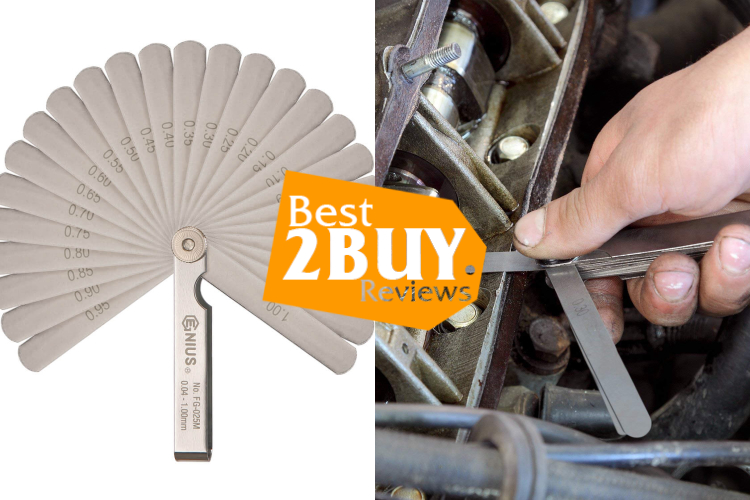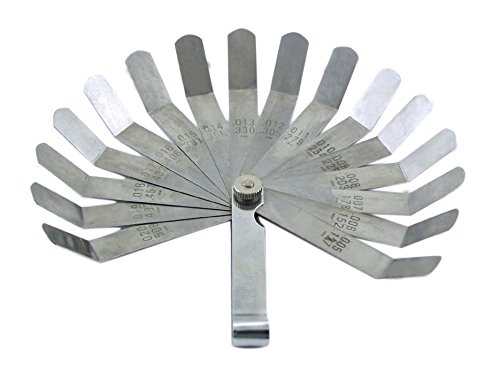Feeler Gauges: A Handy Tool for Precision Measurements

- 1. Feeler Gauges: A Handy Tool for Precision Measurements
- 1.1. What is a Feeler Gauge?
- 1.2. How Does a Feeler Gauge Work?
- 1.3. Feeler Gauge Types
- 1.4. Advantages of Feeler Gauges
- 1.5. Applications of Feeler Gauges
- 1.5.1. Automotive Sector
- 1.5.2. Engineering and Manufacturing
- 1.5.3. Woodworking and Carpentry
- 1.5.4. Electrical and Electronics
- 2. What To Consider When Choosing A Feeler Gauge
- 2.1. Choice of Material
- 2.2. Range of Thickness
- 2.3. Precision
- 2.4. Blade Length and Width
- 2.5. Handle or Holder
- 2.6. Price
- 3. Conclusion
Precision measurements hinge on accuracy, making it paramount for individuals in various fields like professional mechanics, engineers, and even DIY enthusiasts. Possessing the correct set of tools is indispensable in this regard. Among these tools, the feeler gauge, though often overlooked, plays a pivotal role in attaining precise measurements.
What is a Feeler Gauge?
A feeler gauge comprises a collection of slender metal or plastic strips designed for assessing the space or distance between two objects. It encompasses a set of blades with differing thicknesses, each clearly labeled with its respective measurement. Typically, these blades are fastened together at a single end, creating a convenient and user-friendly instrument.
How Does a Feeler Gauge Work?
Feeler gauges operate based on the concept of "go/no-go" measurements. Users choose the suitable blade from the set and try to insert it into the gap being assessed. If the blade smoothly fits without encountering any resistance, it signifies that the gap falls within the desired range. Conversely, if the blade cannot be inserted or seems excessively loose, it signals that the gap is either too narrow or too wide.
Feeler Gauge Types
- Wire-Type Feeler Gauges
A wire-type feeler gauge differs from the standard shim setup. Instead of consisting of a series of graded metal leaves or blades, the wire feeler gauge comprises a series of inflexible metal wires. These wires are calibrated to specific thicknesses and are typically bent at a right angle. Wire-type feeler gauges are commonly used to measure spark plug gaps and are sometimes referred to as spark plug gap gauges. - Blade Feeler Gauges
Among the various types of gap gauges available online, blade feeler gauges are perhaps the most commonly encountered. They typically include a range of graded, flattened metal shims or leaves that can be folded in or out of a central case or sheath. These blades can be easily fanned out from the central case to select and access the desired one. If a single strip becomes damaged or breaks, you can purchase an individual replacement strip of the same thickness. - Thin Feeler Gauges
All feeler gauges are inherently thin because their purpose is to fit into and measure narrow gaps that are often too tight for most other conventional measuring tools, such as tape measures. It is relatively uncommon to find sets that include blades thicker than approximately 5mm at the upper limit, although such sets do exist. Most individuals who purchase feeler gauges for mechanical or engineering tasks are primarily concerned with measuring much smaller gaps. Thin feeler gauges can be graded down to thicknesses as slim as 0.02mm or even less. The measurements for individual blades may be provided in either metric or imperial units, or both. When shopping online for gap gauges in the UK, make sure to check that your chosen product displays the appropriate measurement units for your needs. - Angled Feeler Gauges
Angled feeler gauges are equipped with tips that are bent at a slight angle compared to the rest of the blade. This design is advantageous for accessing hard-to-reach gaps where it may not be possible to insert a standard gap gauge straight enough to obtain an accurate measurement of the gap's width. These are also known as offset feeler gauges. - Feeler Gauge Sets
It is more common to begin by purchasing a feeler gauge set and then replace individual blades if they become damaged or worn over time. A set of multiple blades or leaves allows you to test various strips of different thicknesses in the gap you are attempting to measure. This typically simplifies the process of determining the gap size through a straightforward comparison and elimination method. - Plastic Feeler Gauges
A plastic feeler gauge is one in which the blades are constructed from plastic material instead of metal. Although less physically durable than most metal counterparts, plastic feeler gauges can be highly valuable in specific situations and applications. They do not corrode, are non-conductive, and therefore do not generate sparks. Additionally, they will not scratch any of the components you are measuring gaps between. Plastic versions are often color-coded to facilitate differentiation between specific shim thicknesses.
Advantages of Feeler Gauges
Feeler gauges present several advantages over alternative measuring instruments:
- Versatility
Feeler gauges are available in various thicknesses, facilitating precise measurements across a wide spectrum of applications. They are capable of measuring gaps ranging from minute fractions of an inch to several millimeters in size. - Portability and Compactness
Feeler gauges are exceptionally compact and lightweight, rendering them highly portable. Their diminutive dimensions allow them to navigate tight and confined spaces, making measurements in inaccessible areas feasible. - Cost-Effectiveness
Compared to other precision measuring tools, feeler gauges are notably economical. They deliver exceptional value for the investment, considering their adaptability and long-lasting durability. - User-Friendly
Feeler gauges are characterized by their simplicity and user-friendliness. Marked with clear measurements and employing a straightforward go/no-go principle, they are accessible even to novices who can swiftly comprehend their operation.
Applications of Feeler Gauges
Feeler gauges have diverse applications across various industries and fields. Here are a few instances:
Automotive Sector
In the automotive industry, feeler gauges play a pivotal role. They are extensively utilized for tasks like calibrating valve clearances, fine-tuning spark plug gaps, and inspecting brake pad wear. These measurements are essential for guaranteeing optimal engine performance, fuel efficiency, and overall safety.
Engineering and Manufacturing
In the realms of engineering and manufacturing, feeler gauges find their place in measuring gaps within machinery, aligning components precisely, and ensuring adherence to specified tolerances. They prove particularly valuable in tasks such as aligning gears, adjusting bearing clearances, and configuring machinery for exacting operations.
Woodworking and Carpentry
Feeler gauges also serve as indispensable tools in woodworking and carpentry. They enable craftsmen to measure gaps between joints, assess surface flatness, and maintain precise spacing between components. These capabilities contribute to the achievement of accurate and seamless woodworking projects.
Electrical and Electronics
Within electrical and electronics applications, feeler gauges are employed for measuring gaps between contacts, fine-tuning the spacing of circuit board components, and verifying proper insulation. These measurements are critical in preventing short circuits, ensuring dependable connections, and upholding electrical safety standards.
What To Consider When Choosing A Feeler Gauge
Choice of Material
The choice of material for your feeler gauge holds significant importance. Feeler gauges are typically crafted from stainless steel, renowned for its durability, resistance to corrosion, and long-lasting performance. Stainless steel variants are less susceptible to rust and premature wear, making them an excellent fit for demanding applications. Nevertheless, there are alternative feeler gauges constructed from materials like brass or plastic, which may be appropriate for specific use cases.
Range of Thickness
Feeler gauges are available in diverse thickness ranges, and selecting the right one is crucial. It's essential to consider the scope of measurements you will be dealing with and ensure that the chosen feeler gauge adequately covers that range. Opting for a gauge with a broad range of thicknesses is advisable to cater to various applications and enhance versatility.
Precision
Precision plays a pivotal role in the realm of feeler gauges. The primary purpose of utilizing a feeler gauge is to acquire exact measurements, underscoring the importance of selecting a gauge that guarantees high accuracy. Seek out gauges that are meticulously manufactured, featuring clear and well-defined markings. Additionally, opting for gauges that have undergone calibration or certification for accuracy is advantageous.
Blade Length and Width
The dimensions of the feeler gauge blades hold significant significance. Longer blades offer extended reach and facilitate access to confined spaces, whereas wider blades enhance stability and ease of use. Depending on your particular application, you may require a feeler gauge with longer or wider blades. It is prudent to select a gauge that offers an array of blade lengths and widths to cater to diverse measurement needs.
Handle or Holder
Certain feeler gauges are equipped with handles or holders, whereas others are stand-alone blades. The presence of a handle or holder can streamline the handling and manipulation of the gauge, especially when working in tight spaces or when dealing with greasy or oily conditions. Assess whether a handle or holder would be advantageous for your specific application and make your choice accordingly.
Price
The cost of a feeler gauge can fluctuate based on factors like brand, quality, and the number of blades included in the set. Typically, a basic set of feeler gauges featuring a limited number of blades may range from $5 to $20. Conversely, more comprehensive sets, encompassing a wider spectrum of blade sizes and boasting higher precision, can command prices ranging from $20 to $50 or even higher. It is essential to weigh your specific requirements and budget constraints when making your feeler gauge selection.
Conclusion
Feeler gauges may appear unassuming, yet their significance in attaining precise measurements cannot be emphasized enough. Whether it's automotive maintenance or precision engineering, these adaptable instruments have diverse applications across multiple industries. Their small size, cost-effectiveness, and user-friendliness make them an essential tool for anyone striving for precision in their tasks. Thus, when the occasion arises for measuring a gap or clearance, consider using a feeler gauge to enjoy the convenience and precision it provides.











